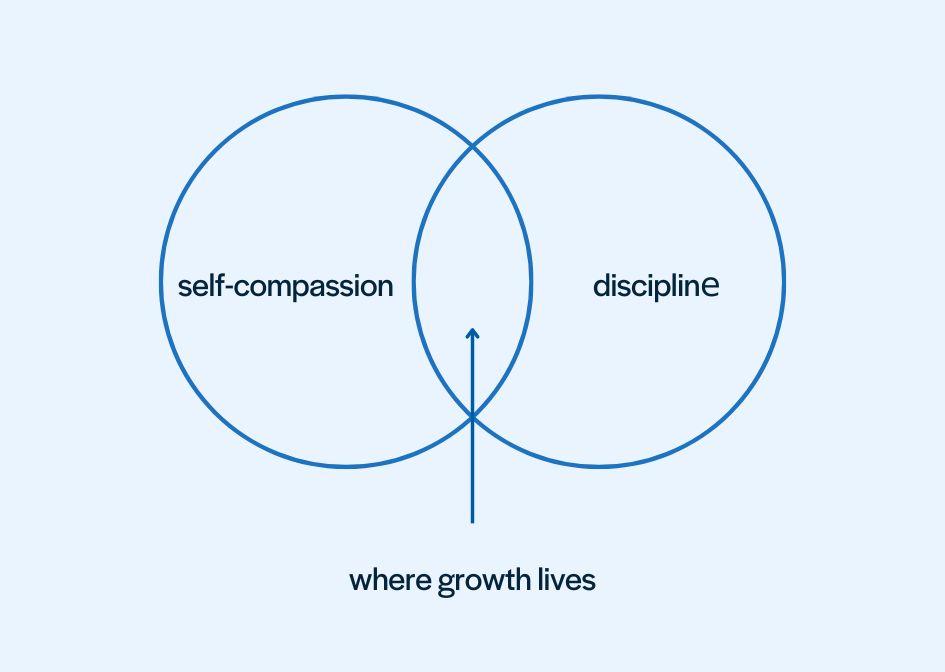Self-Discipline is the Highest Form of Self Respect
Honor the future you — self‑discipline is not a punishment, but rather a gift and a show of respect to future you.
Self‑Discipline Is a Sign of Respect to Your Future Self
Discipline often wears a hard face in popular culture. We picture early alarms, strict meal plans, and calendars stuffed with color‑coded tasks. Yet true self‑discipline is much gentler. It is the daily promise, “my future comfort matters, so I will act with care right now.”
Every deliberate choice becomes a vote for the person you long to meet next year, next month, or even tomorrow morning. When you decide to stretch before bed or turn off your phone at 10 p.m., you honor the version of yourself who will wake up pain‑free and clear‑headed. That respect builds confidence faster than any outside praise.
Why Kindness Alone or Discipline Alone Miss the Mark
Think of growth as happening in the space between two poles: kindness to yourself and accountability for your actions. Lean too far toward kindness and progress slows; lean too hard into rules and you risk burnout. The middle space balances the two.
Self-compassion (kindness) lets you recover quickly after a slip. It whispers, “One misstep doesn’t erase all the steps behind it.” Discipline (accountability) nudges you back on course the following day. Together, they turn discipline into a sustainable rhythm rather than a short burst of willpower.
Living in the Middle: Four Simple Practices
1. The Two‑Minute Question
Tape a note where you start each morning (on the mirror where you brush your teeth or by your coffeemaker): “What choice today helps tomorrow’s me?” Try to finish that action before noon. Early wins set a respectful tone for the whole day.
2. Reframe Discipline as a Gift
Many hear “discipline” and imagine bland meals or endless gym hours. Recast it as freedom. Consistently completing physical therapy saves time once wasted in urgent‑care lines. Choosing a phone‑free bedtime delivers clear mornings for family, creativity, or journaling. Discipline prevents pain and anxiety from dictating tomorrow’s plans.
3. Weekly Reset
Pick one evening each week to review your habits. List three actions you kept and one you skipped. Instead of blaming yourself, ask, “What made that step hard?” Adjust the plan rather than scolding the person.
4. Future‑Self Thank‑You Note
Write a short note dated three months ahead with the items named that you wish to include in your new routines: “Thank you for sticking with daily walks. My knees feel stronger, and I sleep better.” Keep the note in a planner. Reading it reminds you that discipline is gratitude paid forward.
Speak to Yourself Like a Valued Friend
The inner monologue drives behavior more than any external rule book. When talking to yourself, borrow the tone you’d use with someone you love—firm, honest, and encouraging. “I know you’re capable of this and I believe in you” feels very different from “You never get it right.”
If a workout is skipped, respond with curiosity: “What drained my energy today?” Adjust bedtime or nutrition rather than piling on shame. Discipline rooted in kindness rebounds quickly; discipline rooted in scolding often collapses under guilt.
Turning Respect into Habit
Self‑respect, like all muscles, grows with repetition. Begin small. Choose one micro‑discipline this week: ten mindful breaths before meals, a nightly journal line, or reading two pages before sleep. Track the action for seven days. Notice how a single change boosts confidence in other areas. Small wins compound.
Over time, you will trust your own word. That trust frees mental energy for creativity, relationships, and play because you no longer negotiate basic commitments. You simply keep them, the way you keep a meeting with a dear friend.

